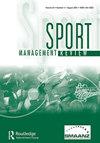青少年体育运动中的不文明行为和心理安全:相互作用及其对幸福感和社会结果的影响
IF 3.8
1区 教育学
Q1 HOSPITALITY, LEISURE, SPORT & TOURISM
引用次数: 2
摘要
由于青少年易受社会环境的影响,他们在体育运动中往往会出现粗鲁无礼的行为。Incivility是指不尊重他人的不敏感行为,即不尊重他人、粗鲁无礼的行为。不文明行为是青少年体育运动中的一个重要问题,因为它对团队和个人产生了负面影响。本研究旨在探讨青少年运动员不文明行为与心理安全的关系,以及心理安全初值和心理安全变化对青少年运动员幸福感和社会结果的影响。本研究采用三波滞后数据收集方法,纳入283名青少年运动员,共完成三次问卷调查。用交叉滞后面板和生长潜曲线模型对假设进行了扫描电镜检验。结果表明,教练员和队友的不礼貌行为与心理安全感的变化有显著相关。相反,心理安全的初始值是随后教练和队友不文明行为、幸福感和社会结果的重要前提。最后,心理安全感的变化与青少年运动员的幸福感和社会结果显著相关。研究结果表明,不文明行为和心理安全是相互相关的,心理安全而不是不文明行为是青少年幸福感和社会结果的显著预测因子。本研究发现了青少年体育运动中不文明行为、心理安全和基本结果(即幸福感和社会结果)之间关系的机制。随着时间的推移,教练和队友的不文明行为影响了心理安全感的变化。心理安全预测了随后教练和队友的不文明行为。心理安全与青少年运动员的幸福感和社会结果显著相关。本文章由计算机程序翻译,如有差异,请以英文原文为准。
Incivility and psychological safety in youth sport: the reciprocal effects and its impact on well-being and social outcomes
ABSTRACT Youth can often be the subject of rude and discourteous behaviors in their sport setting, given their susceptibility to the social environments. Incivility refers to insensitive behavior that exhibits a lack of respect for others, namely, disrespectful and rude behaviors. Incivility is a significant issue in youth sport since it negatively influences teams and individuals. The present study aims to investigate 1) how incivility and psychological safety are associated with each other over time and 2) the influence of the initial value of psychological safety and the change in psychological safety on youth athletes’ well-being and social outcomes. Three-wave time-lagged data collection was employed, and the present study included 283 youth athletes who completed the survey three times. The hypotheses were tested in SEM with cross-lagged panel and growth latent curve modeling. The results showed that coach and teammate incivility were significantly associated with the change in psychological safety. In contrast, the initial value of psychological safety was a significant antecedent of the subsequent coach and teammate incivility, well-being, and social outcomes. Lastly, the change in psychological safety was significantly associated with youth athletes’ well-being and social outcomes. The findings suggest that incivility and psychological safety were reciprocally associated, and psychological safety rather than incivility was a significant predictor of youths’ well-being and social outcomes. The present study found a mechanism underlying the relationship between incivility, psychological safety, and essential outcomes (i.e., well-being and social outcomes) in youth sport. HIGHLIGHTS Coach and teammate incivility influenced the change of psychological safety over time. Psychological safety predicted subsequent coach and teammate incivility. Psychological safety was significantly associated with youth athletes’ well-being and social outcomes.
求助全文
通过发布文献求助,成功后即可免费获取论文全文。
去求助
来源期刊

Sport Management Review
Multiple-
CiteScore
9.00
自引率
7.30%
发文量
27
期刊介绍:
Sport Management Review is published as a service to sport industries worldwide. It is a multidisciplinary journal concerned with the management, marketing, and governance of sport at all levels and in all its manifestations -- whether as an entertainment, a recreation, or an occupation. The journal encourages collaboration between scholars and practitioners. It welcomes submissions reporting research, new applications, advances in theory, and case studies. The language of publication is English. Submissions are peer reviewed.
 求助内容:
求助内容: 应助结果提醒方式:
应助结果提醒方式:


